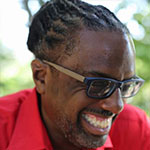Ask the Advocate: Dealing with Judgmental People
HIV stigma manifests in different ways. One form of stigma that hits close to home, however, is the judgment from family members, friends, and loved ones.
Results from the 2019 HIV In America Survey showed that community members experienced the following: 48 percent feel like people judge them for being HIV positive and have also felt stigmatized by their sexual partners (27 percent), friends (24 percent), and social media (18 percent).
Dealing with judgmental people and lack of social support
So we asked community advocates for H-I-V.net: How do you deal with family members or loved ones who are judgmental of you for being HIV positive? Here are their responses.
Removing toxic people from my everyday life
 When it comes to dealing with individuals who are judgmental and negative to me, I place them in the toxic category. It took a lot for me to learn to handle toxic people in my life. To be honest, it took some work with a therapist to set up personal boundaries; individuals who cannot respect my personal boundaries are toxic. I have come to a place in my life where I need and choose to do what is best for me. In this case, this means removing toxic people from my everyday life. I am not saying that I never see them, but I limit my time with these individuals. I choose to live my best life for myself and that means not allowing anybody to have control of my mental or physical health. - Heather
When it comes to dealing with individuals who are judgmental and negative to me, I place them in the toxic category. It took a lot for me to learn to handle toxic people in my life. To be honest, it took some work with a therapist to set up personal boundaries; individuals who cannot respect my personal boundaries are toxic. I have come to a place in my life where I need and choose to do what is best for me. In this case, this means removing toxic people from my everyday life. I am not saying that I never see them, but I limit my time with these individuals. I choose to live my best life for myself and that means not allowing anybody to have control of my mental or physical health. - Heather
Entertaining people that add peace or income into my life
 When I was first diagnosed, I was so misinformed. Everyone just wanted me to stay alive because I had just become a mother and was trying to navigate both experiences with little knowledge. As I grew more informed and began talking about my diagnosis, the tension and worry eased from my family. Years later, when I hear something problematic or judgemental about the work I do and communities I work in, I simply ask: “Is what I’m choosing to do about my health and my community taking away from your life in any way?” I ask this because I personally have committed to only entertaining people that add peace or income into my life. Anything else is not meant for me to discern while I’m trying to unlearn generational conditioning and practices. I try to always respond in love and be equipped with a resource to confirm the information I give. - Kamaria
When I was first diagnosed, I was so misinformed. Everyone just wanted me to stay alive because I had just become a mother and was trying to navigate both experiences with little knowledge. As I grew more informed and began talking about my diagnosis, the tension and worry eased from my family. Years later, when I hear something problematic or judgemental about the work I do and communities I work in, I simply ask: “Is what I’m choosing to do about my health and my community taking away from your life in any way?” I ask this because I personally have committed to only entertaining people that add peace or income into my life. Anything else is not meant for me to discern while I’m trying to unlearn generational conditioning and practices. I try to always respond in love and be equipped with a resource to confirm the information I give. - Kamaria
It has been a struggle but I continue to speak out
 Dealing with family members and loved ones who are judgemental about me living with HIV has been a struggle. I remember how long it took for me to share with my MaDear and my sisters that I was living with HIV. I was so afraid of how they would respond. It took me nearly five years to disclose my status. After I did, many more of my family members and love ones found out about my status. In the beginning, things were okay. However, things changed for the worst after I began to share my status publicly and through activism. Once I did, their shame and stigma came to the surface. After I came to understand where their negative attitudes were coming from, I had to make a choice. The choice of if I would continue to do what I needed to do to obtain a healthy outlook or to go back to being silent and socially isolated. I decided to continue speaking out. I share this with many people, "The longer I stand in my truth, the longer time I give my family members and loved one to stand beside me." - Khafre
Dealing with family members and loved ones who are judgemental about me living with HIV has been a struggle. I remember how long it took for me to share with my MaDear and my sisters that I was living with HIV. I was so afraid of how they would respond. It took me nearly five years to disclose my status. After I did, many more of my family members and love ones found out about my status. In the beginning, things were okay. However, things changed for the worst after I began to share my status publicly and through activism. Once I did, their shame and stigma came to the surface. After I came to understand where their negative attitudes were coming from, I had to make a choice. The choice of if I would continue to do what I needed to do to obtain a healthy outlook or to go back to being silent and socially isolated. I decided to continue speaking out. I share this with many people, "The longer I stand in my truth, the longer time I give my family members and loved one to stand beside me." - Khafre
My chosen family taught me the true meaning of love and acceptance
 I personally don't deal with family members who judge me for being HIV positive. I've learned a long time ago that family is just the word until it's fully applied. If you can't accept me for who I am and all parts of my life, then you can't be a part of my life. I've learned, outside of my family, the true meaning of being a brother, son, uncle, etc., through my extended chosen family. They taught me the true meaning of love and acceptance. But if you're a person who can't just easily cut off ties with judgemental family members, I will first advise that you learn everything that you can about HIV. So when the questions come your way, you're able to educate your family members about this disease. This you will have to do in doses and bit-by-bit. You may just be the first person known to them to be living with HIV or even the first person to educate them about HIV. If you're not comfortable having a conversation yourself, maybe you could send some education links to them. - Jahlove
I personally don't deal with family members who judge me for being HIV positive. I've learned a long time ago that family is just the word until it's fully applied. If you can't accept me for who I am and all parts of my life, then you can't be a part of my life. I've learned, outside of my family, the true meaning of being a brother, son, uncle, etc., through my extended chosen family. They taught me the true meaning of love and acceptance. But if you're a person who can't just easily cut off ties with judgemental family members, I will first advise that you learn everything that you can about HIV. So when the questions come your way, you're able to educate your family members about this disease. This you will have to do in doses and bit-by-bit. You may just be the first person known to them to be living with HIV or even the first person to educate them about HIV. If you're not comfortable having a conversation yourself, maybe you could send some education links to them. - Jahlove
The HIV in America 2019 survey was conducted online from July through September of 2019. A total of 400 people completed the survey.

Join the conversation